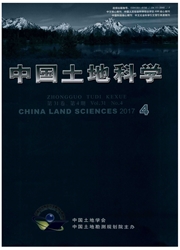

 中文摘要:
中文摘要:
研究目的:从公共经济学的角度探讨土地利用规划中利益均衡问题的产生背景、原因及其理念。研究方法:文献资料法、逻辑推理法。研究结果:土地利用规划可以减少私人决策对社会造成的损失,防止因市场失灵造成的土地资源低效利用。但是,中国现行规划在土地利用主体利益均衡方面存在制度缺陷,使其难以解决各主体之间的利益均衡问题,这是现行规划实施难的重要原因之一。研究结论:土地利用规划的本质是技术支持下的政策制定与执行过程,应树立土地利用主体的利益与责任、以及利用中的代际之间、人地之间的均衡观,注重土地;刊用的多目标协调,实现规划代内利益均衡和代际间公平的同时,保障规划的有效实施。
 英文摘要:
英文摘要:
The purpose of this paper is to discuss the background and causation of equilibrium of interests in land use planning with the basic theory of public economy. Methods of documentation and logic reasoning were employed. Results suggest that land use planning may reduce the social loss of the individual decision making, and prevent low efficient land use due to market failure. However, there are some institutional disadvantages in the equilibrium of interests among different land users of the current land use planning in China, which creates difficulties in implementation of planning. It is concluded that the nature of land use planning is the process of policy-making and implementation with technical support. Furthermore, the ideas of equilibrium should be formulated which will balance the interests and responsibilities of various land users, different generations, human and land resources. Much attention shall be paid to coordinate the multi-objectives of land use. The effective implementation of land use planning shall be guaranteed and the balance of inter-generation and intra-generation should be reached.
 同期刊论文项目
同期刊论文项目
 同项目期刊论文
同项目期刊论文
 期刊信息
期刊信息
